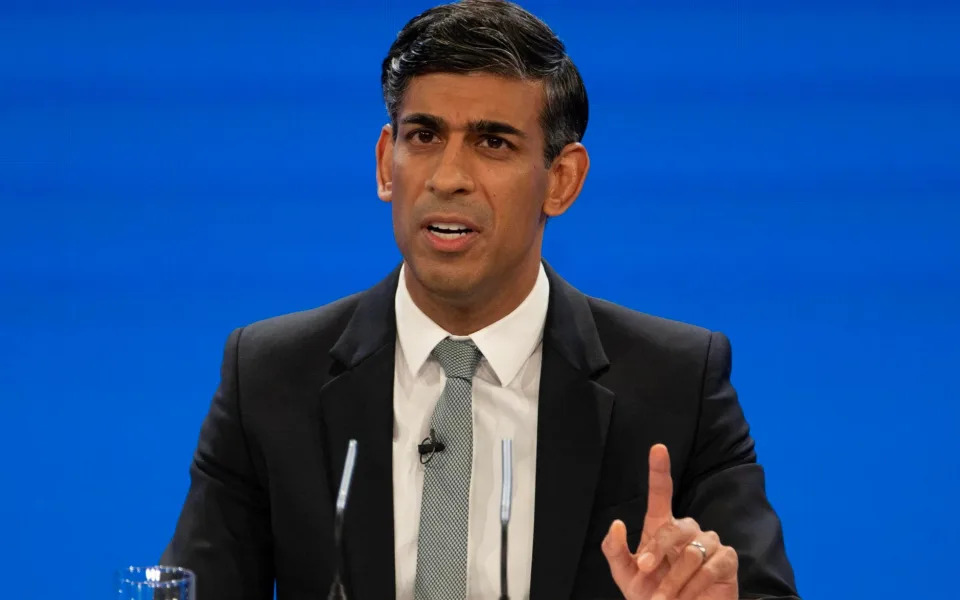James Titcomb
Wed, 4 October 2023

Rishi Sunak last month delayed the ban on the sale of new petrol and diesel cars as part of a major overhaul of green policies - Paul Grover
Rishi Sunak’s “confusing” net zero policies threaten to derail a recovery in car sales and hit the wider market, one of Britain’s biggest dealerships has warned.
Vertu Motors, which operates 190 forecourts under brands including Bristol Street Motors and Macklin Motors, said that demand from retail customers had been “muted” in recent months.
The Prime Minister said last month that the ban on the sale of new petrol and diesel cars will be delayed by five years to 2035 as part of a major overhaul of Britain’s net zero policies.
However, the Government has maintained its zero-emission vehicle (ZEV) mandate on carmakers. The rules require that four in every five vehicles sold by manufacturers must be electric by the end of the decade.
Robert Forrester, chief executive of Vertu, said the Government’s “confusing messaging” risked contributing to a further dampening of car sales. He added that carmakers are resorting to discounts and offers to try to boost flagging demand.
Tesla, the world’s biggest electric carmaker, has repeatedly cut prices in the last 12 months in an attempt to boost sales amid the rising cost of charging electric cars.
Mr Forrester said: “These market dynamics combined with the ZEV mandate have the potential to disrupt the recovery of the new car market in the next few years.”
Manufacturers will have to ensure that 80pc of their new car sales are electric by 2030, with targets gradually rising from 22pc due to come in at the start of next year. Carmakers that cannot hit the annual targets must either sell more electric vehicles in future years, purchase credits from rivals or pay a fine of £15,000 per car.
Mr Forrester told The Telegraph that the policies “will potentially put a brake on the level of growth” and labelled the decision to maintain targets for carmakers “slightly baffling”.
He predicted that manufacturers might even start to hold back supplies of electric vehicles in the coming months to ensure they have enough stock to hit the 22pc target when it comes into force next year.
He added that new post-Brexit tariffs on electric car imports and exports across the channel, due to come into force in January, were a “further challenge”.
Under so-called rules of origin laws that come into force from January, 45pc of the value of an electric car must originate from either the UK or the EU. This is due to rise to 65pc in 2027.
The Government is looking to delay the changes, although France is believed to oppose the request.
While sales of new electric cars in Britain have grown by 40.5pc this year, Vertu said this was exaggerated by a leap in fleet sales to large organisations, and that sales to retail customers fell by 8.5pc.
It said that the average price of a used electric vehicle had fallen by 44pc in the last year, having been inflated by a shortfall in supply a year ago. “Used EV pricing appears to have bottomed out and a new, more affordable base price has been established for used electric vehicles,” it said.
Sales of new cars in Britain have been slow for three years straight because of a chip shortage squeezing production as well as cost of living pressures and rising interest rates.
Vertu’s comments came as it posted a 21pc increase in sales to £2.4bn in the six months to September, boosted by the acquisition of Helston Garages. Pre-tax profits rose by 11.7pc. The Gateshead-based company also boosted its dividend.
The company said it had set out a strategy to sell more Chinese electric vehicles, which have “some cost and potentially technological advantages” and may take market share away from established carmakers.
BYD, China’s biggest maker of electric vehicles, has pledged to “demolish” established Western rivals with cheaper vehicles. This week the company came within touching distance of overtaking Tesla’s electric vehicle sales.
No comments:
Post a Comment